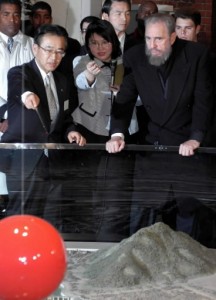Mourning in Hiroshima over death of Fidel Castro, who showed concern for A-bomb survivors
Nov. 27, 2016
by Kazuo Murakami, Masanori Wada and Daisuke Neishi, Staff Writers
Fidel Castro, the former President of the Council of Ministers of Cuba, died on November 25. Prompted by his strong personal desire to visit the A-bombed city, Mr. Castro came to Hiroshima in March 2003 and toured the Peace Memorial Museum in Naka Ward. Over the years he maintained a keen interest in promoting the abolition of nuclear arms, and upon the announcement of his death, made on November 26, A-bomb survivors in Hiroshima mourned his passing. They called Mr. Castro a compassionate leader and said his death was all the more sad because he was a high-profile figure who could send out strong messages to the world.
Minoru Hataguchi, 70, a resident of Hatsukaichi City and a former director of the Peace Memorial Museum, guided Mr. Castro around the museum at that time. During this tour of the museum, Mr. Hataguchi was asked by Mr. Castro how the survivors were faring. When he told the Cuban leader that he had been in his mother’s womb when the atomic bomb exploded above the city, Mr. Castro asked whether or not his mother was in good health. Mr. Hataguchi recalled that, although he guided many foreign leaders around the museum, only Mr. Castro asked that sort of question, which indicated his concern for the survivors.
When Mr. Hataguchi showed Mr. Castro a pocket watch and a belt buckle that had belonged to his father, who died as a result of the atomic bombing, Mr. Castro unexpectedly embraced him. Although Mr. Castro projected the image of a tough revolutionary, he was actually a compassionate leader who was averse to conflict and war, Mr. Hataguchi said.
During his lifetime, Mr. Castro persistently spoke out on the dangers of nuclear weapons on many occasions and in speeches he made in Cuba. He also directed criticism against the speech made by U.S. President Barack Obama when he visited Hiroshima this past May, the first sitting American president to do so. Mr. Castro objected to the fact that Mr. Obama’s speech included no words of apology to the scores of ordinary citizens who were killed by the atomic bomb.
Many groups of A-bomb survivors also mourned Mr. Castro’s death. Toshiyuki Mimaki, 74, the vice chair of the Hiroshima Prefectural Confederation of A-bomb Sufferers Organizations (Hidankyo, chaired by Sunao Tsuboi), said, “Mr. Castro was a very influential person in the world, so his death is very sad. I hope the new Cuban leader will also visit Hiroshima.”
Kunihiko Sakuma, 72, the chair of the other Hiroshima Prefectural Confederation of A- and H-Bomb Sufferers Organizations, mentioned the 1962 Cuban Missile Crisis which resulted in the world teetering on the brink of nuclear war. He said that Mr. Castro must have felt a strong desire to abolish nuclear weapons, and he renewed his commitment to advance that wish.
(Originally published on November 27, 2016)
Fidel Castro, the former President of the Council of Ministers of Cuba, died on November 25. Prompted by his strong personal desire to visit the A-bombed city, Mr. Castro came to Hiroshima in March 2003 and toured the Peace Memorial Museum in Naka Ward. Over the years he maintained a keen interest in promoting the abolition of nuclear arms, and upon the announcement of his death, made on November 26, A-bomb survivors in Hiroshima mourned his passing. They called Mr. Castro a compassionate leader and said his death was all the more sad because he was a high-profile figure who could send out strong messages to the world.
Minoru Hataguchi, 70, a resident of Hatsukaichi City and a former director of the Peace Memorial Museum, guided Mr. Castro around the museum at that time. During this tour of the museum, Mr. Hataguchi was asked by Mr. Castro how the survivors were faring. When he told the Cuban leader that he had been in his mother’s womb when the atomic bomb exploded above the city, Mr. Castro asked whether or not his mother was in good health. Mr. Hataguchi recalled that, although he guided many foreign leaders around the museum, only Mr. Castro asked that sort of question, which indicated his concern for the survivors.
When Mr. Hataguchi showed Mr. Castro a pocket watch and a belt buckle that had belonged to his father, who died as a result of the atomic bombing, Mr. Castro unexpectedly embraced him. Although Mr. Castro projected the image of a tough revolutionary, he was actually a compassionate leader who was averse to conflict and war, Mr. Hataguchi said.
During his lifetime, Mr. Castro persistently spoke out on the dangers of nuclear weapons on many occasions and in speeches he made in Cuba. He also directed criticism against the speech made by U.S. President Barack Obama when he visited Hiroshima this past May, the first sitting American president to do so. Mr. Castro objected to the fact that Mr. Obama’s speech included no words of apology to the scores of ordinary citizens who were killed by the atomic bomb.
Many groups of A-bomb survivors also mourned Mr. Castro’s death. Toshiyuki Mimaki, 74, the vice chair of the Hiroshima Prefectural Confederation of A-bomb Sufferers Organizations (Hidankyo, chaired by Sunao Tsuboi), said, “Mr. Castro was a very influential person in the world, so his death is very sad. I hope the new Cuban leader will also visit Hiroshima.”
Kunihiko Sakuma, 72, the chair of the other Hiroshima Prefectural Confederation of A- and H-Bomb Sufferers Organizations, mentioned the 1962 Cuban Missile Crisis which resulted in the world teetering on the brink of nuclear war. He said that Mr. Castro must have felt a strong desire to abolish nuclear weapons, and he renewed his commitment to advance that wish.
(Originally published on November 27, 2016)








